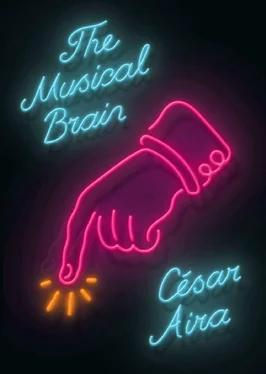Cecil gave up another of his temporary jobs, and, with some money he’d saved, spent the winter months studying and composing. In spring, a contract came up for a couple of dates, in a bar in Brooklyn, where they laughed in his face and threw him out. As he was traveling home in the train, the rocking movement and the stations sliding by put him in a meditative frame of mind. It struck him that the logic of his predicament was in fact perfectly clear, and he wondered why he hadn’t seen it before: in all those edifying tales about pianos and violins, there was always a musician whose talent wasn’t recognized at first, but in the end it was. That was where the mistake lay, in the transition from failure to triumph, as if they were two points, A and B, joined by a line. In fact, failure is infinite, because it’s infinitely divisible, unlike success.
Let’s suppose, said Cecil in the empty carriage at three in the morning, that in order to be recognized I have to perform for an audience whose coefficient of sensitivity and intelligence has a certain threshold value, x. And let’s say I start off performing for an audience with a coefficient of x/100, then I’ll have to “go through” an audience whose coefficient is x/50, then one with a coefficient of x/25. . and so on. There was no need to reinvent Zeno’s famous argument: it was all too obvious.
Six months later he was hired to play in a dive frequented by French tourists: existentialists, who came to the city of jazz in search of powerful emotions. He arrived at midnight, as agreed, and they took him straight to the piano. Sitting on the stool, he stretched his hands out toward the keys, and launched into a series of chords. . There were a couple of unemphatic bursts of laughter. With a cheerful look on his face, the master of ceremonies was waving him off the stage. Had they already decided that it was a joke? No, they were actually quite indignant. To ease the tension, an older pianist took his place immediately. No one said a word to Cecil; still, he hoped they’d pay him a part of the promised sum (as they always did), and he stayed there watching and listening to the pianist. He could hear the influence of Ellington and Bud Powell. . The guy wasn’t bad. A conventional musician, he thought, is always dealing with music in its most general form, as if leaving the particular for later, waiting for the right moment. And they did pay him: twenty dollars, on the condition that he would never show his face there again.
“The Spy” has been translated for this volume from the revised version of the text in Relatos reunidos (Mondadori, 2013). Likewise, “Cecil Taylor” has been translated from the revised version, published as a book by Mansalva in 2011 with illustrations by El Marinero Turco.












